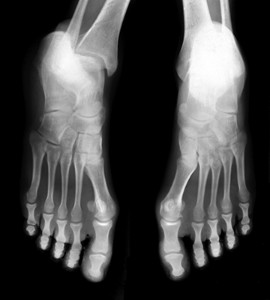What Is a Stress Fracture?
Monday, 06 January 2020 00:00 People who enjoy running are generally familiar with the importance of properly training, which often includes gradually increasing mileage and speed. This may be beneficial in reducing the risk of getting a stress fracture. This type of injury is known as a hairline fracture, and develops over time. It occurs when the bones are stressed from frequent exercise, and are unable to heal properly. An X-ray is typically taken to determine the extent of the stress fracture, followed by implementing recovery methods. These can consist of wearing a protective boot for approximately six weeks, or having surgery performed that may be necessary to heal severe stress fractures. If you have endured this type of injury, it is advised that you schedule a consultation with a podiatrist who can guide you toward treatment options that are correct for you.
People who enjoy running are generally familiar with the importance of properly training, which often includes gradually increasing mileage and speed. This may be beneficial in reducing the risk of getting a stress fracture. This type of injury is known as a hairline fracture, and develops over time. It occurs when the bones are stressed from frequent exercise, and are unable to heal properly. An X-ray is typically taken to determine the extent of the stress fracture, followed by implementing recovery methods. These can consist of wearing a protective boot for approximately six weeks, or having surgery performed that may be necessary to heal severe stress fractures. If you have endured this type of injury, it is advised that you schedule a consultation with a podiatrist who can guide you toward treatment options that are correct for you.
Stress fractures occur when there is a tiny crack within a bone. To learn more, contact Dr. Eugenio Rivera from Calo Foot & Ankle Specialists. Our doctor can provide the care you need to keep you pain free and on your feet.
How Are They Caused?
Stress fractures are the result of repetitive force being placed on the bone. Since the lower leg and feet often carry most of the body’s weight, stress fractures are likely to occur in these areas. If you rush into a new exercise, you are more likely to develop a stress fracture since you are starting too much, too soon. Pain resulting from stress fractures may go unnoticed at first, however it may start to worsen over time.
Risk Factors
- Gender – They are more commonly found in women compared to men.
- Foot Problems – People with unusual arches in their feet are more likely to develop stress fractures.
- Certain Sports – Dancers, gymnasts, tennis players, runners, and basketball players are more likely to develop stress fractures.
- Lack of Nutrients – A lack of vitamin D and calcium may weaken the bones and make you more prone to stress fractures
- Weak Bones – Osteoporosis can weaken the bones therefore resulting in stress fractures
Stress fractures do not always heal properly, so it is important that you seek help from a podiatrist if you suspect you may have one. Ignoring your stress fracture may cause it to worsen, and you may develop chronic pain as well as additional fractures.
If you have any questions, please feel free to contact our office located in Bellaire, TX . We offer the newest diagnostic and treatment technologies for all your foot care needs.









